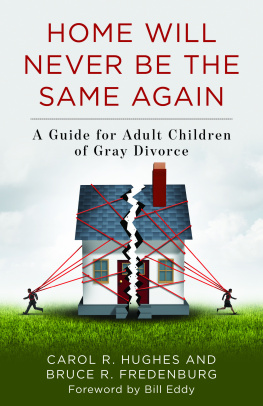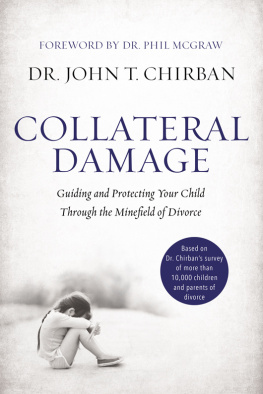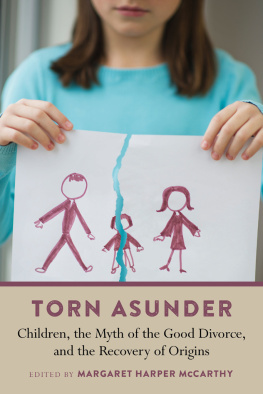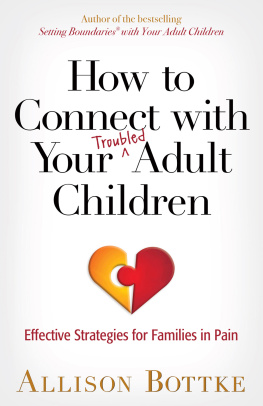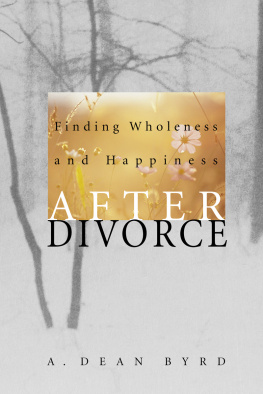First published 2011 by Ashgate Publishing
Published 2016 by Routledge
2 Park Square, Milton Park, Abingdon, Oxon OX14 4RN
711 Third Avenue, New York, NY 10017, USA
Routledge is an imprint of the Taylor & Francis Group, an informa business
Copyright 2011 Chaitali Das
Chaitali Das has asserted her right under the Copyright, Designs and Patents Act, 1988, to be identified as the author of this work.
All rights reserved. No part of this book may be reprinted or reproduced or utilised in any form or by any electronic, mechanical, or other means, now known or hereafter invented, including photocopying and recording, or in any information storage or retrieval system, without permission in writing from the publishers.
Notice:
Product or corporate names may be trademarks or registered trademarks, and are used only for identification and explanation without intent to infringe.
British Library Cataloguing in Publication Data
Das, Chaitali.
British-Indian adult children of divorce : context, impact and coping.
1. Adult children of divorced parents--Great Britain. 2. Adult children of immigrants--Family relationships--Great Britain. 3. South Asians--Great Britain--Social conditions.
I. Title
306.8'9'089914041-dc22
Library of Congress Cataloging-in-Publication Data
Das, Chaitali.
British-Indian adult children of divorce : context, impact and coping / by Chaitali Das.
p. cm.
Includes bibliographical references and index.
ISBN 978-1-4094-0824-6 (hbk)
1. Divorce--Great Britain--Cross-cultural studies. 2. Adult children of divorced parents--Great Britain--Cross-cultural studies. 3. East Indians--Great Britain. I. Title.
HQ875.D37 2011
306.89089'914041--dc22
2010048802
ISBN 9781409408246 (hbk)
ISBN 9781315570365 (ebk)
Preface
Research on Divorce and Identified Gaps
In current societies, various family forms exist which depart from the traditional notions of the family. Family and marriage are being reshaped and redefined in terms of its values and its functions and one sees a split between marriage and parenthood (Cere 2003). Contemporary British families reflect this with family forms ranging from cohabiting families, divorced families, remarried families, step-families, single-sex families, adopted families, and single-parent families. Over the last four decades, divorce has played a significant role in the reshaping of the family. Divorce, in Britain as well as other western countries, has had a significant impact on families and their transition into other family forms, such as single-parent families, remarried, and step-parent families.
In spite of a vast array of literature and research available on the subject, there is scope to further develop understanding of divorce processes and address some gaps. For instance, researchers have indicated the scope of studies within cross-cultural contexts, and in societies that are in transition to further inform our understanding of divorce (Berardo 1990, Kitson and Morgan 1990, White 1990, Goode 1993, Cherlin 1999, Simons et al. 1999). In addition, while studies on mainstream populations in the western contexts do exist, there is little that has explored divorce in other ethnic and non-white populations that have migrated and/ or are resident in these countries. The understanding of divorce, its consequences, impact and processes for ethnic families have remained understudied.
As indicated above divorce studies have primarily been informed by a white-western perspective since most research on divorce has focussed on white communities using predominantly white samples (Mitchell 1985). Though these research findings have contributed to the understanding of divorce processes, there is a need to validate these findings with other racial and ethnic groups, particularly because the fact racial and cultural differences permeate across all life experiences (Bigle and Kaufman 1983, Smart 2000, Reynolds 2002). Cultural perspectives are in fact critical in studying families of ethnic groups and findings from one culture cannot be generalised onto others (Berry 2006). Most studies on divorce have largely ignored cultural influences of other non-white ethnic groups (Dilworth-Anderson and McAdoo 1988). Divorce introduces very complex arrangements for families and child care. Simplistic, generalised and causal relationships may not hold true across different contexts (Smart and Shipman 2004) and need to be understood through research that includes diverse ethnic and racial groups, and study the processes and factors that are salient in the lives and experiences of minority ethnic groups.
In addition, though divorce studies have been highly informed by quantitative studies, particularly in the United States of America, there is scope for further understanding divorce processes qualitatively. Rodgers and Pryors (1998) review of studies of divorce in the United Kingdom (UK), also identified the lack of qualitative research as a gap. A number of qualitative studies since, have greatly promoted the understanding of a range of issues that take into account children experiences, roles of grandparents, issues of communication and contact, and sibling relationship in the divorce environment. Some qualitative studies (not an exhaustive list) include Smart and Neale (1999), Dunn and Deater-Deckard (2001). Trinder et al. (2002), Smart and Wade (2002); Abbey and Dallos (2004) and Buchanan (2009). However, there remain very limited qualitative or quantitative studies that have been informed from an ethnic or racial perspective. Singhs (1998) study on lone Asian mothers in London which included a sample of divorced women, is among a few exceptions to this. Similarly, while there is recognition for the inclusion of childrens voices and their narratives, within the divorce context, there is limited representation of the divorce experiences of children from diverse ethnic groups.
While studies on causes and consequences of divorce are able to indicate some important and significant aspects, it is hard to ascertain definitive outcomes of divorce for children. Two reasons can be afforded to this. First, the variety and complexity of the process of divorce, associated environment factors and individual differences, make generalisations for impact of divorce, difficult (Popay et al. 1983, Kroll 1994, DCruz and Bharat 2001). Thus, while divorce may be regarded positively by children in cases of domestic violence, abusive, high conflict and dysfunctional families (Nye 1957, Landis 1960, Despert 1962, Jekielek 1998), children still reportedly miss their absent parents, may want their parents to remain together in spite of the conflict and sometimes even consider the pre-divorce situation to be better than the post-divorce situation (Wallerstein and Kelly 1980, Walzack and Burns 1989). Individuals and families are embedded within their social, environmental, legal, emotional, and financial contexts. Since divorce processes interact with and have an impact across these various contexts, it is often hard to predict the outcomes of these interactions. Furthermore, the interaction, reactions and agency of individual members in families within such situations can be hard to predict and measure. But these are, nonetheless, critical in determining outcomes. Second, studies conducted in the past cannot predict changes that are recent and responsive to divorce as a social phenomenon. In other words, past research may not necessarily represent contemporary contexts (Mitchell 1985). Indeed, a brief historical analysis of divorce studies indicates how perspectives and studied outcomes of divorce have seen shifting (Berardo 1990, Smart 2000). Early studies of divorce that focussed on divorce as an event have given way to the view of divorce as a process of family transition (Ahrons and Rodgers 1987, Burgoyne et al. 1987, Kitson and Morgan 1990, Smart 2000). While divorce studies in the 1980s and 1990s indicated a high negative impact of divorce on children and families, more recent research stresses the management of the divorce process. Children of divorce may face higher risks of maladjustment and negative outcomes but this does not necessarily indicate actual maladjustment and negative outcomes for children, as most children adjust without severe negative outcomes (Cherlin 1992, Wyman et al. 1999). More recent studies also suggest that initially predicted negative outcomes of divorce have diminished over time as communities and families have learnt to manage divorce better (Amato and Keith 1991a, Faust and McKibben 1999, Pike 2003)



